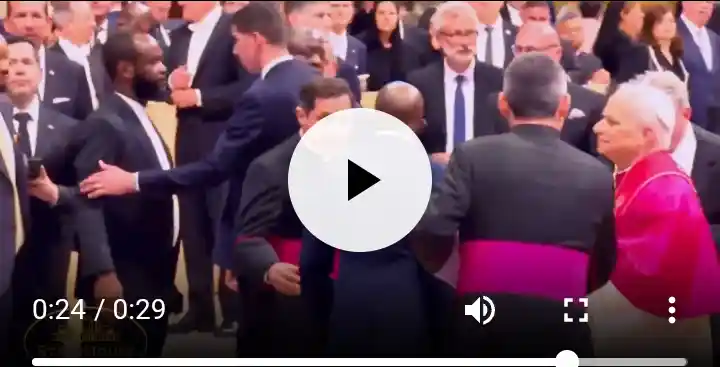Viral Video: Moment Seyi Tinubu Blocked While Trying to Approach Pope Leo XIV at Vatican Ceremony
- Advertisement -
… Pope’s orderly team leaned in to whisper into President Tinubu’s ear, … was then politely guided away by Vatican protocol officials
A viral video circulating on social media has captured a dramatic moment involving Seyi Tinubu, son of Nigeria’s President Bola Ahmed Tinubu, during the official inauguration ceremony of Pope Leo XIV at the Vatican. The footage, obtained by TJ News Nigeria, shows the exact instance Seyi Tinubu was blocked by papal security as he attempted to approach the newly installed Pontiff.
Scene at the Vatican: A Strictly Timed Engagement
During the high-profile event, global dignitaries lined up to greet Pope Leo XIV after his formal enthronement as the spiritual leader of the Catholic Church. President Bola Tinubu, among the attending heads of state, was seen briefly interacting with the Pope—offering a handshake and a few words in a respectful exchange.
- Advertisement -
However, moments into the encounter, a member of the Pope’s orderly team leaned in to whisper into President Tinubu’s ear. According to eyewitnesses and body language experts who reviewed the clip, the whisper likely signaled that the Nigerian leader’s allotted time with the Pope had expired.
President Tinubu was then politely guided away by Vatican protocol officials to make room for other waiting dignitaries.
Seyi Tinubu’s Attempt and the Blocked Approach
As President Tinubu was being ushered aside, Seyi Tinubu, who had been standing nearby, appeared to make a sudden move toward the Pope—possibly intending to also greet the pontiff or be introduced. But in a swift reaction, papal security and event coordinators immediately intervened, physically blocking Seyi from proceeding further.
- Advertisement -
WATCH Video Here
The video clearly shows officials pointing him in the opposite direction, signaling the end of the interaction and enforcing the strict ceremonial protocol observed during papal engagements.
- Advertisement -
Social Media Reactions and Public Commentary
The video has sparked a flurry of reactions across Nigerian and international social media platforms. While some users sympathized with Seyi Tinubu, calling the moment an “honest mistake,” others criticized the move as an overreach of informal protocol, noting that non-delegated individuals typically do not approach the Pope without prior clearance.
Prominent commentators and protocol experts have weighed in, stressing that papal events follow strict diplomatic and ceremonial guidelines, and deviations are often quickly corrected to preserve order and sanctity.
“In events involving the Pope, everything is timed to the second. No individual, not even family members of world leaders, are allowed unscheduled contact. It’s standard,” a Vatican analyst told TJ News Nigeria.
No Official Response Yet from Aso Rock or the Vatican
As of the time of this report, there has been no official statement from the Nigerian Presidency or from Vatican officials regarding the incident. Attempts to reach presidential spokespersons for comment have been unsuccessful.
However, diplomatic insiders suggest the matter is unlikely to escalate further, as such moments are often treated as minor breaches—especially when no formal disruption occurs.
- Advertisement -
Pope Leo XIV’s Inauguration Marks a New Era
The inauguration of Pope Leo XIV marks a significant chapter in global religious leadership, with representatives from over 100 countries present to witness the ceremonial transfer of the Holy See. The Pope, known for his emphasis on humility and reform, delivered a message of peace and interfaith unity during his first public address.
President Bola Tinubu was among several African leaders invited to attend the event, which was broadcast live and covered by international news networks.
What you should know
The brief but telling moment involving Seyi Tinubu has highlighted the importance of strict protocol at international religious events, and the incident serves as a reminder of the boundaries that even close relatives of dignitaries must respect in formal diplomatic settings.
The video clip continues to trend online, offering a window into the behind-the-scenes realities of global power dynamics and public representation.
- Advertisement -


